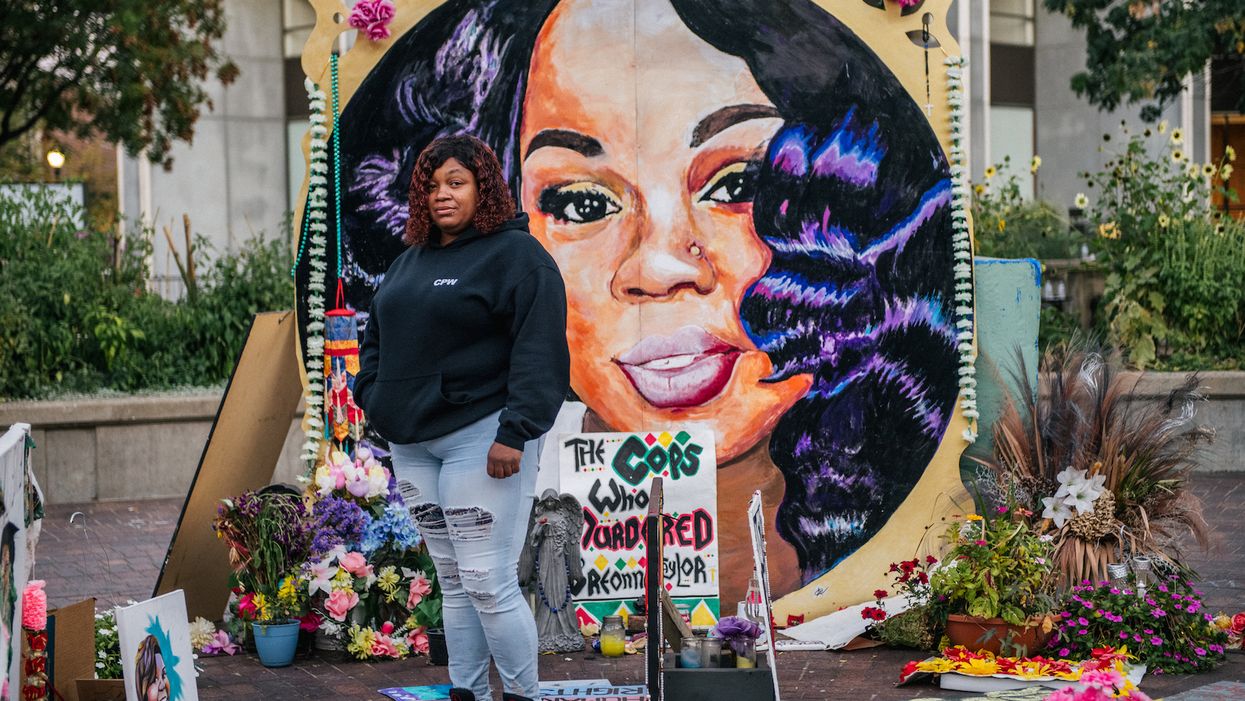
Tamika Palmer, mother of Breonna Taylor, poses for a portrait in front of a mural of her daughter at Jefferson Square park on Monday in Louisville, Kentucky. (Photo by Brandon Bell/Getty Images)

The real problem has nothing to do with the charges
Protesters predictably took to the streets in anger after Kentucky Attorney General Daniel Cameron announced the charges against former Louisville Metropolitan Police Department Sgt. Brett Hankison on Wednesday.
Hankison was charged with three counts of wanton endangerment. It's a felony charge, but it has nothing to do with the fact that the officers shot and killed Breonna Taylor in her home during an overnight raid. Hankison was charged because he recklessly shot into the building and surrounding apartments. The two other officers involved were not charged at all.
Legally, it was probably the right call. And that's the problem. That's why it's so frustrating.
Taylor was suspected to be connected to her ex-boyfriend's drug trafficking activity. So the police had a warrant that legally allowed them to break into Taylor's apartment after midnight on March 13. The warrant didn't require them to knock, although Cameron claims they did.
Kenneth Walker, Taylor's boyfriend, was also in the apartment. He was a legal gun owner. When men, not in uniform, broke in the apartment in the middle of the night, he did what almost anyone with a gun might do — he used that gun to defend himself, his loved one, and their property from aggressors.
He didn't know he was shooting at cops. He thought it was a home invasion. Which is, by the way, an exceedingly reasonable thought to have when someone suddenly begins beating down your door in the middle of the night.
So in the heat of the moment, Walker fired one shot, which hit one of the officers in the leg. The officers then sprayed roughly two dozen bullets into and around the apartment, with six of them hitting Taylor. Walker was left inside to call 911, sobbing inconsolably, as he called for help for his dying girlfriend and tried to make sense of what had just happened.
AUDIO: 911 call from Kenneth Walker night Breonna Taylor diedyoutu.be
Once Walker fired that shot, the officers were legally enabled to use deadly force against Taylor and Walker. Every one of those 20+ bullets was legally justified because of Walker's one shot.
Breonna Taylor was not a violent criminal. At this point, there's no proof that she's a criminal at all. Police didn't find any drugs, drug money, or illegal weapons in her apartment after they killed her. The problem isn't the charge against Hankison; the problem is the decisions that led to that violent confrontation in the first place.
If police are going to be protected in situations where they have to use deadly force against suspects — which they must be in order to do their jobs — then they have a responsibility to avoid creating unnecessary situations in which that deadly force must be used, like those LMPD officers did the night Taylor was killed.
Police should not have gotten a no-knock warrant in this situation. Police should not have been sent to break down her door overnight in a surprise raid on the off chance she had some illegal items in her home. She was a 26-year-old emergency medical technician. She wouldn't have been difficult to find or arrest any number of other ways, if an arrest was even justified.
But because a potential nonviolent drug offender was treated with such aggression, she was killed, her boyfriend was put in an impossible and traumatic situation, a police officer was shot, another was fired and charged with three felony counts, and public trust for law enforcement took another hit.
And in the end, taxpayers with no role or responsibility in the situation footed the bill for the $12 million settlement the city paid Taylor's family in a civil lawsuit.
A citizen was killed in her home by the state, and while an officer was held accountable for bullets that went through apartment walls, no officers were held accountable for the bullets that pierced Breonna Taylor's body and ended her life.
We need to focus on making sure police are made to carry out their duties in a way that maximizes public safety and doesn't violate people's rights. We have to make sure people like Breonna Taylor don't get treated as expendable because of their proximity to drugs. We have to fight for the change that prevents these encounters from occurring, so we don't have to wait for a charging decision in fleeting hope for some form of justice after someone has been wrongly killed.
Regardless of what you think of Breonna Taylor, or what you think of police, we should all be able to agree that a system that produces this outcome when it works as intended needs to be altered and improved.
Breonna Taylor's life can't be restored, and the pain and trauma felt by her loved ones will last a lifetime. I just pray that the lessons learned from this tragedy can be used to save lives like hers in the future.